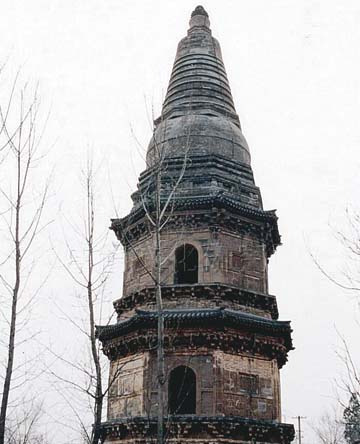IN recent years, an increasing number of small ancient towns in China have come to the public’s attention through the movies. If you have been enchanted by some of the natural scenery you have seen in a Chinese movie, here are some places you may like to visit. Tea Mountain Bamboo Forest, Chongqing 
The “House of Flying Daggers,” directed by Zhang Yimou and starring Zhang Ziyi and Andy Lau, has brought the Tea Mountain Bamboo Forest in Chongqing into the spotlight. Located in the north of Yongchuan County, the national forest park covers an area of 117 square kilometers. Over 90 percent of the park is forest. The diverse plant life in the park includes tea leaves and bamboo. Moreover, the weather tends to be cool and breezy, making it an ideal alternative to staying in a hot, concrete jungle like Shenzhen. As the only shooting location of the aforementioned movie, it has become one of the most famous spots in Chongqing. The park is part of Jishan Mountain. The mountain is thought to be named after Zhuge Liang, the renowned chancellor of the State of Shu Han during China’s Three Kingdoms period about 1,779 years ago. There are 20 ancient temples and tombs on the mountain and art galleries introducing some of the traditional art works of Sichuan Province. The park is a good place to just sit in the sunshine and drink tea. You can also indulge in one of the popular local snacks, boiled egg in tea. The village restaurants also offer a wider selection of dishes than you can find in most big cities. Tickets for the park are 30 yuan. Transport: Fly to Chongqing from Shenzhen Bao’an International Airport and take a long-distance coach from Caiyuanba Coach Station to Yongchuan County and then take a taxi to Tea Mountain Bamboo Forest. Accommodation: There is a wide selection of hotels and hostels in Yongchuan. You can also stay with locals. Zhuozhou, Hebei Province The US$80-million production “Red Cliff,” directed by John Woo, was shot at the Zhuozhou Production Base in Hebei Province, a new landmark built by China Central Television (CCTV). The historical city of Zhuozhou, less than 60 kilometers away from Beijing, is the hometown of Liu Bei, a warlord, military general and later the founding emperor of the state of Shu Han during the Three Kingdoms era of Chinese history (220-280), and Zhang Fei, a famous military general of the state of Shu Han. It is also the place where Liu Bei, Zhang Fei and Guan Yu, also a famous military general of the state of Shu Han, became close friends. Still standing in Zhuozhou today are the temples from the Sui Dynasty (518-618) for Liu Bei and Zhang Fei. The city is considered the cradle of Chinese philosophy, and as symbolizing the heroism and chivalry of the Three Kingdoms period. The movie production base contains settings that can be used to depict the Tang Dynasty (618-907), Han Dynasty (25-220), Qing Dynasty (1636-1911) and old Beijing town (1900-1950). The historical TV drama, “The Romance of the Three Kingdoms,” was shot at the production base’s Han Palace. Not only is it a great place to experience ancient China and traditional Chinese culture but also the perfect place to learn about film production. The main attractions in the area include a mock Han Dynasty city, reconstructions of the city gate towers in ancient Xuchang, Xuzhou and Jingzhou and palaces for emperors, princes, chancellors and government officials. Transport: Fly to Beijing from Shenzhen Bao’an International Airport and take No. 917 bus to Zhuozhou and take a taxi to the movie production base. Accommodation: There is a wide selection of hotels and hostels in Zhuozhou and you can also stay at ancient-style hotels in the production base. (Wang Yuanyuan) | 
